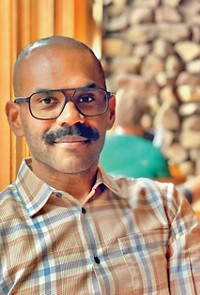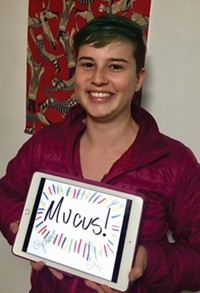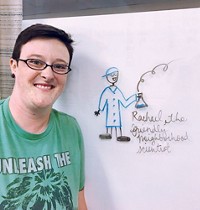Advertisement
Grab your lab coat. Let's get started
Welcome!
Welcome!
Create an account below to get 6 C&EN articles per month, receive newsletters and more - all free.
It seems this is your first time logging in online. Please enter the following information to continue.
As an ACS member you automatically get access to this site. All we need is few more details to create your reading experience.
Not you? Sign in with a different account.
Not you? Sign in with a different account.
ERROR 1
ERROR 1
ERROR 2
ERROR 2
ERROR 2
ERROR 2
ERROR 2
Password and Confirm password must match.
If you have an ACS member number, please enter it here so we can link this account to your membership. (optional)
ERROR 2
ACS values your privacy. By submitting your information, you are gaining access to C&EN and subscribing to our weekly newsletter. We use the information you provide to make your reading experience better, and we will never sell your data to third party members.
Nontraditional Careers
Movers And Shakers
Former US FBI director James B. Comey on majoring in chemistry and how it affected his career
Now an author and lecturer, he used what he learned in chemistry to connect with forensic scientists as he enforced the law
by Cheryl Hogue
February 18, 2019
| A version of this story appeared in
Volume 97, Issue 7

James B. Comey, author of the best-selling book A Higher Loyalty: Truth, Lies, and Leadership, directed the US Federal Bureau of Investigation from 2013 to 2017. Comey spoke with C&EN senior correspondent Cheryl Hogue. They both graduated from the College of William and Mary, and their stints on the student newspaper, The Flat Hat, overlapped. This interview was edited for length and clarity.
Vitals
▸ Hometown: Allendale, New Jersey
▸ Education: BS, chemistry and religion, College of William and Mary, 1982; JD, University of Chicago Law School, 1985
▸ Career highlights: Chief federal prosecutor in New York City and surrounding counties, 2002–3; lead prosecutor of TV personality and businesswoman Martha Stewart on charges of securities fraud, 2003; second in command at US Department of Justice as deputy attorney general, 2003–5; appointed by President Barack Obama to a decadelong term as FBI director, 2013
▸ Career-altering moment: Learning via television that President Donald J. Trump had fired him as FBI director
▸ Current work: Book author and distinguished lecturer in public policy at the College of William and Mary
▸ Secret weapon for getting through 8:00 a.m. advanced biochemistry classes three days a week during his last semester in college: His roommate and fellow chemistry major, Todd Irick, now an industrial hygienist in Ottawa, Ontario. “Todd would swing his legs over the top bunk, hop down, and drag my sorry self out of the bed to go to the class. I’ve told him many times that I’m grateful because who knows what would have happened to me but for that intervention.”
What sparked your interest in chemistry?
In high school, I was interested in becoming a physician and took the hard sciences: biology, chemistry, physics, and Advanced Placement chemistry. I wouldn’t say I was so much interested in chemistry as opposed to bio, but I was interested in the sciences as a path to becoming a doctor.
You started out as a chemistry major in college. Why?
I saw all the really aggressive premed nerds were flowing to bio—and those people made me extremely nervous. So I thought, to get away from them, I’ll become a chemistry major and maybe that would also be useful in making my application to medical school slightly different from the crowd.
I found chemistry interesting, if difficult, and was determined to major in it. The summer after my sophomore year, I worked for Fisher Scientific at a testing lab in New Jersey. I had a lab coat with my name on it. I worked at a chemistry bench all summer long. It wasn’t until junior year that the drift away from chemistry started.
You didn’t abandon chemistry. You added a second full major—religion. What were the connections between those two disciplines?
There was both a physical and something of a metaphysical connection.
The two departments—chemistry and religion—shared the same building at William and Mary. I literally stumbled across the religion major because I saw the word “Death” on a bulletin board as I was walking to a chemistry lab. It was an advertisement for an upcoming class in the religion department.
I was taking physical chemistry that semester. Physical chemistry was the hardest class I ever took. I took it all of sophomore year. I think I got a C in it at least one of the semesters, maybe both. I had a hard analytical chemistry course. That semester, I was chock full of bio, chem, advanced calculus.
As depressing as it may seem, the opportunity to study death was a refreshing change. I signed up for the class and then took one class after another in the religion department. I ended up writing my thesis in that department.
So there was a literal, physical connection between the two.
In terms of a metaphysical connection, each of them forced me to develop a different part of my game. The chemistry major was really good in forcing me to work on one of my weaknesses, which was the analytical piece of my brain. It also taught me, because I wasn’t naturally good at it, the value of discipline and hard work. I worked my butt off to finish the chemistry major.
Advertisement
Looking back now, having seen my aptitude scores from when I was in the sixth grade, you can see chemistry was not a natural fit for me. I was much more naturally suited to the writing and the philosophizing and the conceptual aspects of the religion major.
My parents weren’t thrilled when I told them during junior year that I was losing interest in chemistry and more interested in theology and philosophy. My dad wrote me a pretty tough letter telling me I was an idiot for losing focus. In my family, seeing things through was really important. It was a mark of character to never quit. Plus I think he was worried I was abandoning a sensible career in medicine for something less sensible.
How has chemistry influenced your career in law?
First, the things that I had to learn—discipline, hard work, becoming better analytically—were really useful to me as an investigator and a trial lawyer. So in general, it’s helped me tremendously. The habits of mind you develop in a chemistry major stay with you.
Second, whenever I had to work with an expert witness in the hard sciences or in building a relationship with the FBI lab, I could speak some language of chemistry. That I had a certain cred because I’d been a chemistry major was really useful to me.
I remember sitting and bonding with the senior scientists at the FBI lab, including the FBI’s world-renowned bomb expert, who is a chemist, a man named Kirk Yeager. He and I connected over sandwiches because we could talk about chemistry. So it paid an unexpected dividend for me in addition to the habits of mind.
What’s your advice for chemistry majors who are interested in law or people in law who are interested in chemistry?
I’d advise them first of all to be clear about how hard it’s going to be. Then, while you’re working that hard, try to broaden yourself.
I was lucky. If I had stayed just with the chemistry major and not gotten exposed to philosophy and theology and creative writing, I think I would have been more narrow than was best for me.
So I encourage students, no matter what field they’re in, to broaden themselves to sample everything that’s at the table. It’s particularly important advice to young people going into chemistry because the field is so hard and so consuming that it can force you to narrow yourself too early in life.

Is there anything you’d like to add?
It’s funny, the random things that stick with you. My five kids have groaned their entire lives when someone says, “What’s new?” and I say, “c over λ.”
People don’t realize this about chemistry: it’s a lifelong source of humor.





Join the conversation
Contact the reporter
Submit a Letter to the Editor for publication
Engage with us on Twitter